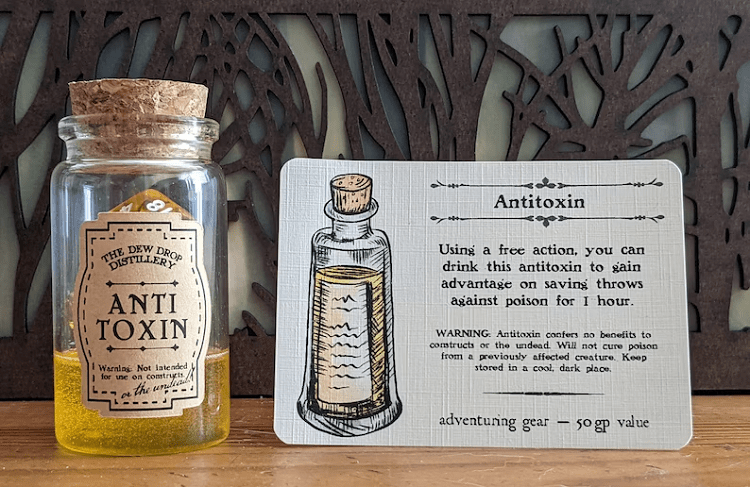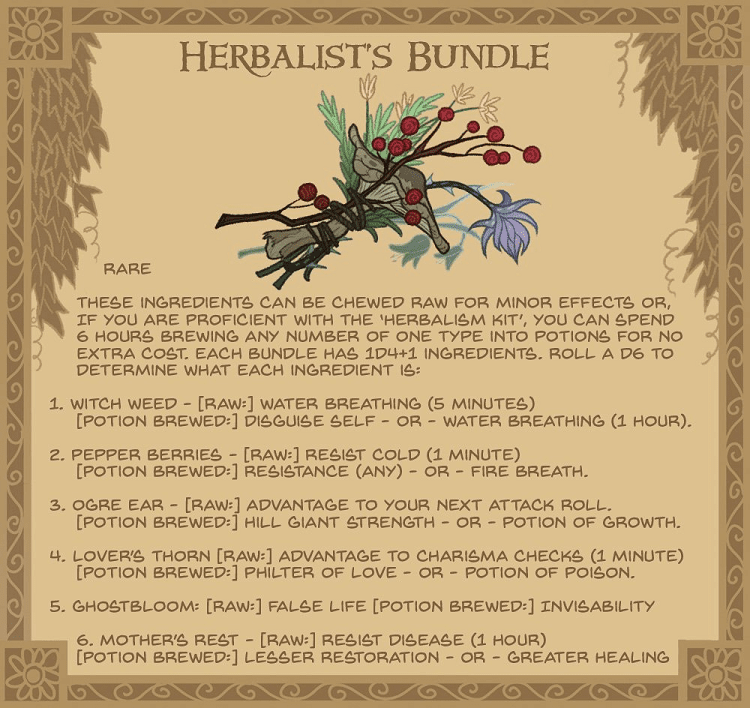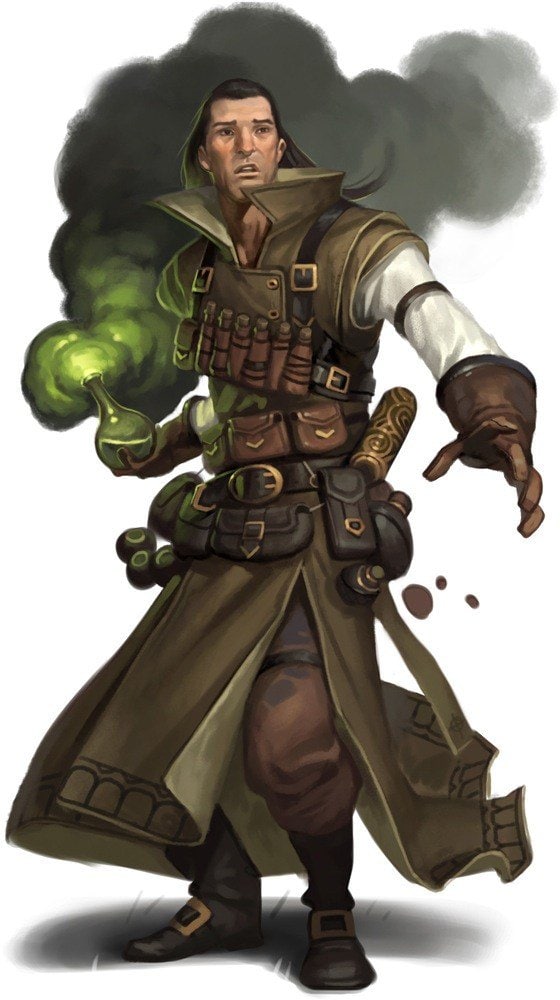An Herbalism Kit 5e guide may make you want to become the ultimate herbalist. If you already have the kit, then you probably want to know how to use it. If you don’t have it, then you want to know if it’s a good choice.
When I was a Ranger, I loved using the Herbalism Kit to benefit my party. I would make salves, potions and spend my nights looking for herbs to take along with us on our journey.
There are over 20 kits and toolsets in the game. Each of them is unique and serves a different purpose. The Herbalism Kit is just one of those kits. What is it, and what can it do?
What is an Herbalism Kit 5e? – Simple Overview
- Type – Tool
- Cost – 5gp
- Weight – 3lbs
- Contains – clippers, mortar and pestle, pouches, and vials
An Herbalism Kit is a tool that players can use to create potions and antitoxins, as well as to identify herbs. The kit contains more than just clippers, mortar and pestle, pouches, and vials.
If you are proficient with the kit, you can add your proficiency bonus to any ability checks that you make when you try to identify or use herbs. You must have proficiency with the kit to make antitoxin and healing potions.
Who Can Use the Herbalism Kit 5e?

Anyone can attempt to use the Herbalism Kit in 5e, but that doesn’t mean they will be successful. The kit only costs 5gp, and it’s common enough that most cities will have one available.
However, just like in real life, using kits isn’t easy. You have to be trained to use them properly, or they won’t do you much good. If you want to start out using an Herbalism Kit, be a Druid Class because they gain proficiency with it.
Also, there are certain backgrounds that have tool and kit proficiencies. Sometimes, you get to choose which kits you are proficient with – leaving you with options that include the Herbalism Kit.
Herbalism Kit Component Breakdown
The Herbalism Kit comes with a few different things stated in the Player’s Handbook. If the DM allows it, you can also add new components to your tool kit from the start or buy them when you’re in town.
Don’t be surprised if you can’t add anything at the start. The base Herbalism kit should have everything you need for your life as an herbalist. Add to it slowly and become a master.
Clippers
Clippers are the essential cutting tools for herbalists. They are used to clip plants safely. Everything about them is straightforward. The type of clippers that you have in your starter kit should be about six inches long.
If you want to ask your DM for more clippers, you may be able to add a few extras. You may want tiny two-inch clippers as well as longer clippers – around a foot or two in length – for cutting saplings and such.
Mortar and Pestle
A mortar and pestle are necessary for grinding up the herbs so that you can use them to make potions. You use the clippers first, then you remove the unusable parts of the plants and grind up the medicinal parts.
If you’re not familiar with a mortar and pestle, the mortar is a small bowl that the herbs go in, and a pestle is a small rounded club that you grind the herbs with—a simple and important tool for herbalists.
Vials
poare where you will store your medicines and potions. You won’t carry a lot at a time, or else they may break. They are also quite heavy when filled. I wouldn’t carry more than ten to twenty vials.
Each vial weighs only a few ounces, so the weight isn’t a problem. You can carry larger potion bottles, but most of the time, you are in a hurry when using potions, so single-servings are ideal.
Pouches

Pouches are where you store your herbs as well as dry medicine. You can wrap salves in cloth and put them in the pouches to work as Neosporin Band-Aids in the Dungeons & Dragons world.
The pouches are probably fairly small. There will be a larger one for all of your herbalist stuff to go in and smaller ones for medicines and herbs. It’s important to keep everything separate for safety reasons.
Custom Items
Custom items are my favorite component of an Herbalism Kit. I like to add things like leather gloves, a sketchbook of known herbs, and tiny tools like tweezers. I also add to my kit each time you visit a shop that sells similar goods.
How to Use the Herbalism Kit in 5e
While some kits are straightforward on how to use them, the same can’t be said for the Herbalism Kit. After all, knowing how it differs from the Alchemist Supplies or one of the other Artisan’s Tools.
Identifying Herbs
You can use the Herbalism Kit to try to identify herbs you find in the wild. You can also use it to look for specific herbs – or foraging. This is an active skill check, not passive knowledge.
The herbs don’t have to be out in the wild. They can also be in stores, restaurants, and more. You can tell if someone is selling fake healing potions or show off by guessing which herbs are in a soup.
Crafting Healing Potions
| Potion | HP Recovered | Crafting Time | Material Cost | Potion Resale Value |
| Potion of Healing | 2d4+2 | A day | 25gp | 50gp |
| Potion of Greater Healing | 4d4+4 | A week | 100gp | 200gp |
| Potion of Superior Healing | 8d4+8 | Three weeks | 1,000gp | 2,000gp |
| Potion of Supreme Healing | 10d4+20 | A month | 10,000gp | 20,000gp |
These are the healing potions and what you need to know about them from an herbalist’s perspective. For other types of potions, you can talk to the DM about what you might know and find recipes along your journey.
Making Antitoxin

Antitoxin is an anti-poison that herbalists can make. It is one of their specialties that makes them differ from other crafters and artisans. Since it is unique to the herbalist, making it is easier than making other potions, but it does require proficiency.
While you may be able to make specialty antitoxin, the basic formula grants the user advantage on saving throws opposing poison for 1 hour. So they roll twice when fighting against poison.
Cooking
This is something not many players utilize, but if you think about it, an herbalist knows what will make food taste good. They know what’s edible, what’s not, and what each herb tastes like.
So you may not know how to cook a steak, but you can probably make it taste good after you cook it. You can also probably make some amazing herbal tea.
Detect Poison
This will have to be approved by the DM, but if the poison is coming from an herb or plant, then there’s no reason an herbalist wouldn’t be able to detect it. So you might as well try.
This won’t work if it is a poison potion that uses magic or chemicals. But it will probably work if you roll well and the poison comes from a poisonous plant.
Kits that Go well with the Herbalism Kit 5e

Though most players never think about taking advantage of having two kits, I believe that they should. You can combine kits to start your own business or have unique skills that no one else does.
Alchemist Supplies
The Alchemist Supplies can sometimes replace the Herbalism Kit. But I prefer them to work in tandem. They each have specialties and weaknesses that the other kit can fill, so I prefer to have both.
Cook’s Utensils
Did I mention I love cooking with herbs? A cook may know how to make something taste good, but they may not know which plants are safe to eat and if they have any healing properties.
Imagine taking both and making “healing brownies” for your party. They would taste good and heal. I’ve always wanted to know what it’s like to drink a healing potion, but maybe a healing treat would be even better.
Glassblower’s Tools
Glassblowers can make potion bottles and vials. So you can use your glassblowing skills to save money and make a profit if you never have to buy anything for your potion business.
Potter’s Tools
You can make your own mortar and pestle – among other things – with Potter’s Tools. I think pottery is a lucrative business to have anyway since you can spend next to nothing on materials and turn it around tenfold.
Poisoner’s Kit
A Poisoner’s Kit can ensure that you can make poisonous potions as well as healing potions. With proficiency in both, you won’t get them mixed up but can definitely play the offense and the defense.
Using Skill Checks Instead of an Herbalism Kit

You can accomplish what you can accomplish with the Herbalism Kit with skill checks instead. The result may not be the same since you don’t have proficiency, but there is always more than one way to get something done in D&D.
Arcana
Arcana can be used to detect if plants have magical properties. If the combination creates a magical effect, your Arcana will know about this. This differs from scientific or natural effects.
Medicine
Medicine can be used in place of an Herbalism Kit to make medicine or find out if a plant has healing properties. Since the use for Medicine is limited, DMs are usually open to you using it to make things and identity plants.
Investigation
If you are foraging, you may be able to use your Investigation to find specific plants. However, the check won’t affect whether you know something about the plant. It will only help you find it.
Nature
Nature is probably the most common skill substitute for the Herbalism Kit. You can use Nature to help you find and identify plants. You can also use it to help you make something such as a salve or tonic.
FAQs
Question: How does the Herbalism Kit Work?
Answer: The Herbalism Kit helps you treat ailments by using natural means. This is very similar to an apothecary in our world; only your DnD characters live in a world where magic exists.
Question: Can I Buy an Herbalism Kit?
Answer: Yes. If you shop around enough, you can buy an Herbalism Kit or make your own by gathering the components in various shops. Doing it this way may even save you coins.
Question: Is the Herbalism Kit 5e a Tool?
Answer: The Herbalism Kit counts as a tool, but it is not an Artisan Tool. It is a kit with a specific use and cannot be chosen for Artisan’s Tool if given the opportunity via a class or background.
Question: How do You Gain Proficiency with the Herbalism Kit?
Answer: You can either choose it as one of your kits from your class or background or work something out with the DM. Oftentimes, a DM will allow you to exchange a level reward for kit proficiency.
Question: Can I Use an Herbalism Kit Instead of a Skill Check?
Answer: Yes, the short answer is yes. You can use the kit in place of Nature or Investigation to forage. You can use it in place of Medicine to create something that heals players. But you have to ask the DM before adding your proficiency bonus.
Is the Herbalism Kit 5e Worth It?
The Herbalism Kit in 5e is worth it for anyone with proficiency in my book. I enjoy using all of the tools and kits in the game. However, the Herbalism Kit is beneficial to your entire party – not just monetarily.
Herbalists were some of the first doctors in the real world, and in the D&D world, they are experts in non-magical healing. I love playing with the Herbalism Kit, so if you can grab it, I recommend it.
You can save lives by creating healing potions or antitoxin for party members in need. In my opinion, the Herbalism Kit is one of the most selfless choices. Then again, it’s also a blast to play as everyone’s favorite apothecary.
- Augury 5e Guide – The Vaguest and Coolest Cleric Spell - September 5, 2022
- Roc 5e Guide – The Big, Dumb Bird You Don’t Want To See - September 5, 2022
- Best Drow Name Ideas – From Alvin to Sânziana - August 30, 2022

